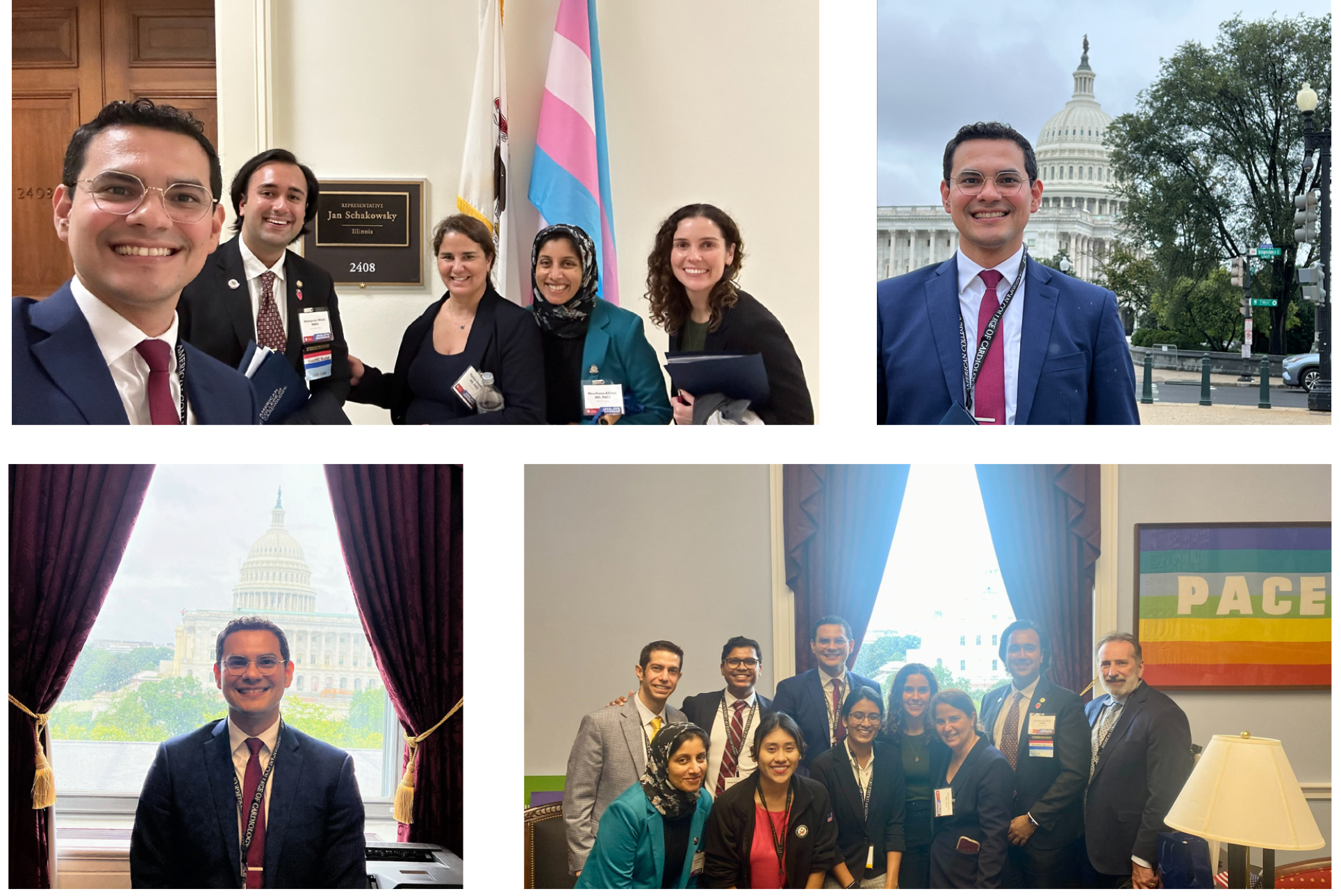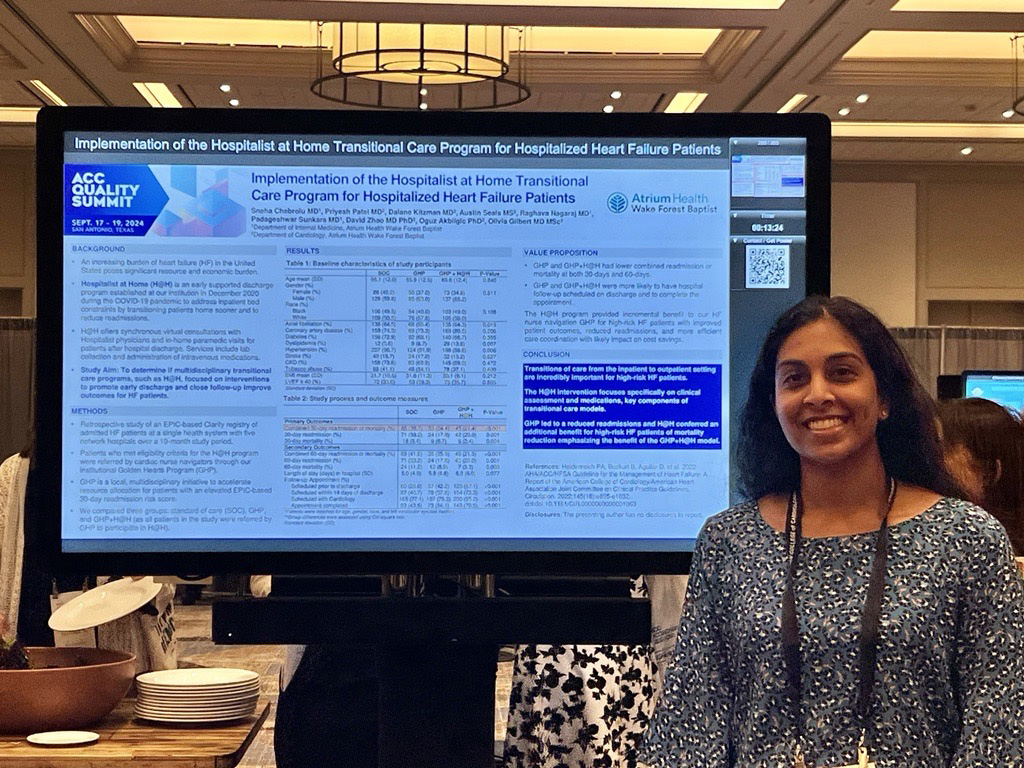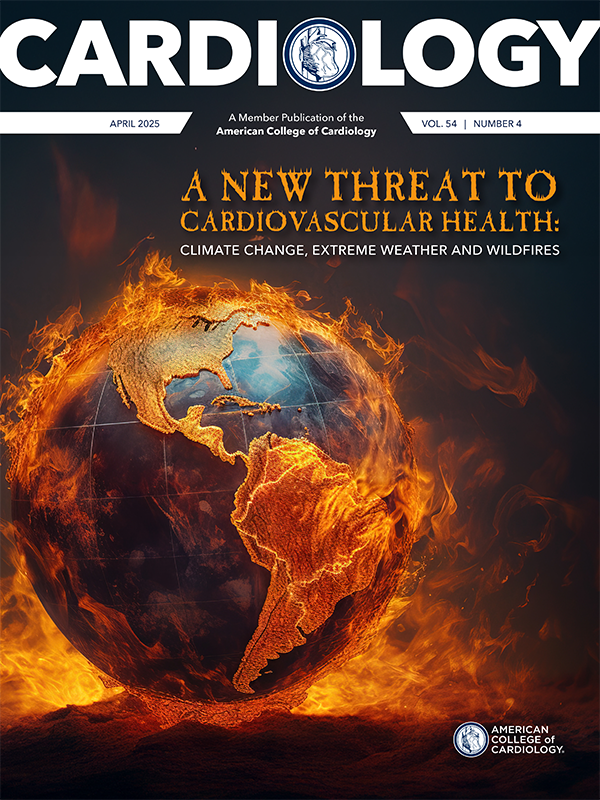Feature | Connecting the Dots: How ACC Involvement Supports Cardiology Trainees

Training to become a cardiologist is a demanding journey, reaching far beyond the mastery of clinical skills to include building community, advancing quality and cultivating leadership.
Over the course of three years, a Fellow in Training (FIT) must gain extensive exposure in the diagnosis and management of cardiovascular diseases, strengthen their procedural experience, engage in scientific research, participate in other scholarly activities, prepare for board examinations and more.
By taking full advantage of the opportunities available through the ACC, trainees looking to pursue a career in cardiology can enhance their clinical knowledge, develop a sense of professional community and lead in improving care, all the while checking many of the boxes required by their training programs.
Reinforcing Clinical Knowledge
ACC's educational resources can help cardiovascular clinicians build and maintain their clinical competencies, regardless of where they are in their career journey.
The continuing education tool ACCSAP is one of many ACC offerings of relevance to fellows looking to identify their knowledge gaps, deepen their understanding of cardiovascular disease and reinforce their growth in the clinical topics they are working to master.
With interactive questions, supportive educational materials, and regular updates to keep up with the latest advancements in adult cardiology, this resource is a game-changing supplement for fellows. The tool covers topics including clinical and practice guidelines, multidisciplinary collaboration, cultural competency, and more.

"Having the opportunity to access ACCSAP, which our fellows do, has been really helpful for them," says ACC Program Directors and Graduate Medical Educators Member Section Chair Benjamin H. Freed, MD, FACC. "The actual learning that goes on from understanding the different topics has been very helpful in preparing them for the cardiovascular boards."
Clinical learnings brought to aspiring cardiologists through the College reach far beyond online resources like ACCSAP.
ACC's Annual Scientific Session creates an environment where trainees can hear about the latest discoveries in the field, develop procedural skills with hands-on simulators and present their own research.
"There is a huge wealth of information that is passed on at the meetings and fellows get to learn from national and international leaders," says Freed. "These meetings offer a lot of case-based and very interactive types of sessions that are very engaging and allow FITs to learn in an environment that's very receptive to learning and understanding."
Highlights from ACC.25 include sessions across all 11 learning pathways geared toward the FIT audience, networking events like the FIT Mix & Mingle, and interactive game-like learning experiences including the annual FIT Jeopardy competition.
Freed also highlights involvement in meetings at the local chapter level, where there are plenty of opportunities for one-on-one mentorship.
"Our Chapter has multiple events throughout the year that are very much targeted toward FITs...and then we have our own FIT Council," he says. "It gives them a sense of what becoming a leader is like."
Nurturing a Passion For Advocacy
With encouragement from Freed, Edgar D. Torres Fernandez, MD, a fellow at Northwestern Medicine-Northwestern Memorial Hospital, attended his first ACC Legislative Conference last year. The annual three-day conference supplies an opportunity for cardiovascular clinicians across the entire care team to come together and advocate on behalf of the profession and patients.

In addition to learning more about ACC Advocacy's key policy priorities and background about the current political environment on Capitol Hill, Torres Fernandez points to both networking with members beyond his local Illinois Chapter and meeting with congressional staff on the Hill as key highlights.
"The connection with these people on Capitol Hill was great," Torres Fernandez says. "We were bringing the experiences of our patients and our own experiences in the real world to them, and seeing how our College and these bills can impact lives in our community."
Speaking with other attendees, Torres Fernandez recalls many attendings wishing they had started participating in advocacy as a fellow after recognizing the impact that ACC's advocacy efforts can have on the day-to-day practice of cardiology.
Coming away from the legislative conference, Torres Fernandez says his appetite for involvement with the ACC has only grown. "The more you do, the more rewarding the work is, and the more connections you make," he says.
Freed promotes the conference as a great learning experience for fellows, having brought several of his own from Northwestern to the event. "It was such an eye opener for them to see how patient advocacy works and what the ACC is specifically doing in that space," he says. "And then, of course, there's the experiential learning that comes with going to the Hill and meeting with the Congress people's staff."
Leading Through Quality
Quality improvement projects, although not a standardized national requirement, are becoming increasingly prevalent in curriculum for residents and fellows in centers across the U.S., according to ACC Quality Summit Chair Olivia N. Gilbert, MD, FACC.
She describes the requirement as "mutually beneficial" to the centers where these projects are being conducted, as well as for the trainees, who get hands-on experience with the "plan, do, study, act" cycle of quality.
The ACC Quality Summit provides an opportunity for these efforts to be showcased and recognized at the national level. "The Quality Summit is the most perfect opportunity for getting feedback," says Gilbert. "As you're walking around, you're looking at all these fantastic ideas that all these centers have done and thinking, 'hey, we could very easily pick that up and take it home to implement tomorrow.'"
Sneha Chebrolu, MD, a resident at Wake Forest University School of Medicine, presented a poster abstract at last year's Summit investigating the impact of an early supported discharge program called "Hospitalist at Home" for high-risk heart failure (HF) patients. She and her co-authors found that this program, providing synchronous virtual consultations with hospitalist physicians and in-home paramedic visits for patients after discharge, provided an incremental benefit in mortality rates when compared to the institution's existing program, which accelerated resource allocation for high-risk HF patients.

"It was really exciting to speak with other attendees at the 'Ask the Authors' experience and discuss how different hospital systems are working to improve patient outcomes," Chebrolu says. "Everyone was really encouraging and provided insightful feedback on our project."
Chebrolu intends to continue working in quality throughout her career. "Quality improvement is quite interesting because it requires combining clinical, policy and socioeconomic factors to achieve meaningful results. As providers, we have a unique perspective on the health care system and can help create or advocate for practical solutions to address the challenges we witness on a daily basis," she adds.
Participating in quality projects also gives trainees the chance to lead in driving improvements at their institution, according to Freed.
"No matter what type of cardiology practice they go into, learning how to navigate through the hospital systems and understand some of the inefficiencies that might exist, and then have the tools to figure out how to improve those inefficiencies is really essential," he says.
Call For Abstracts
ACC Quality Summit 2025 is now accepting abstract submissions for both live sessions and ePosters. Make a lasting impact with your quality improvement (QI) project by presenting it at this year's Summit in Denver, CO!
Gain recognition for your work, network across disciplines and contribute to the future of cardiovascular care. Plus, your work could be selected for publication in JACC: Case Reports special QI issue!
Submission deadlines are May 27 for live sessions and June 23 for ePosters. Learn more and share your quality improvement successes.
Building Lifelong Clinical Competency
Learn more about ACCSAP and how it can help you pass the boards.
Visit ACC Anywhere, the College's comprehensive video library featuring on-demand sessions from ACC live meetings and more. Learn more and activate your account at ACC.org/Anywhere.
Better Together: Community and Learning
ACC's FIT Member Section is the starting point for networking, mentorship, leadership training and recognition, along with education and collaboration with other FITs. Learn more about this community and its benefits in developing your career.
Be a Voice For Change
The ACC is focused on developing and advancing solutions to increase access, quality and value of patient care and promote heart health. Advocating for patients and the profession is a vital component of this effort. Learn more about the ACC Legislative Conference and for resources to understand ACC Advocacy and more. The 2025 ACC Legislative Conference will be held Oct. 5-7 in Washington, DC.
Keywords: Cardiology Magazine, ACC Publications, Education, Continuing, Quality Improvement, ACC Advocacy, Learning

